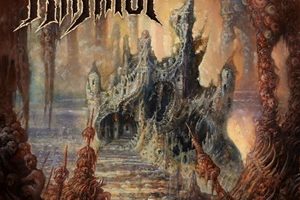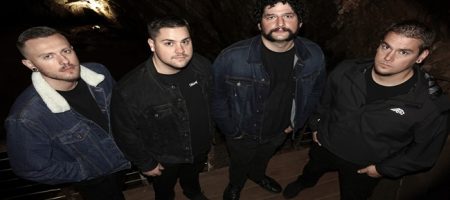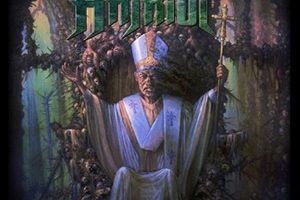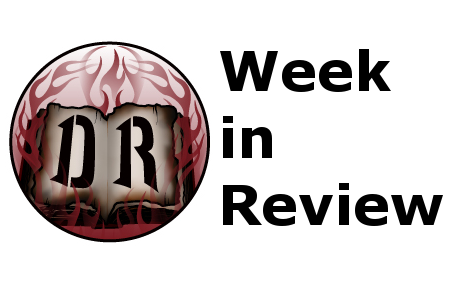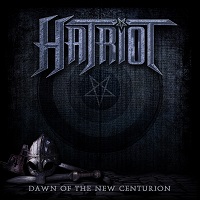Hatriot – Nightmares of Madness
Thursday, 8th August 2019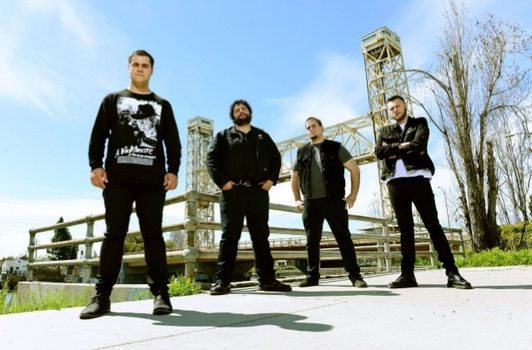
Already gaining a head start on other upstarts through Steve ‘Zetro’ Souza on vocals, Hatriot released two full-length albums of Bay Area style thrash, featuring a rhythm section that included Zetro’s offspring in sons Cody on bass and Nick on drums. It’s been five-years since releases – during that interim, things have gotten quite busy on the touring front for Exodus, leading Hatriot to reassess their lineup and inject a heavier slant on some parts of the vocals and music. Who knew that Cody would step up on vocals, reminding people of Zetro’s venomous mid-range raspy melodies, but also adding some growls and screams that come from the new school of metal to boot?
From Days unto Darkness is the group’s third full-length – attacking the listener with a bevy of steamroller riffs and exciting lead breaks, while also adding a bit of modern punch and dynamics as far as occasional blast beats and death/modern nuances to the mix. In other words, taking a thrash platform into the 21st century, especially given the influences of youth at hand. Reaching out to vocalist/bassist Cody Souza on an early Saturday morning, he was quite enthusiastic to discuss the outlook of Hatriot now, the reasons behind the five year delay between records, what it’s like having Zetro as a father and the special weird musicians the boys grew up around, and discussion about the Bay Area metal scene today versus the 80’s heydays.
Dead Rhetoric: From Days unto Darkness is the third Hatriot album – and the first with you stepping up on lead vocals, taking over for your dad who has been quite busy obviously with Exodus. What sort of pressure/expectations did you have going into the development/recording of this material, and when did you feel confident enough to step up to the challenge?
Cody Souza: I get asked this question a lot, which is cool. We had two shows lined up, and Exodus had a flash tour that put them on the road. Hatriot had two shows booked, with D.R.I. in San Jose and M.O.D. in Modesto, with Billy Milano. We were at practice and we were kind of bummed that we were going to have to find a replacement for these shows because our singer couldn’t make it. I walk up to the mic and I started imitating Pop’s vocals, and you should have seen my brother’s face drop. He thought I sounded dead on like our dad, we could do this. We practiced for a few weeks and I met up with Juan Urteaga, who has worked on all our albums at Trident Studios, and we recorded two songs we did before with my vocals over it. I showed it to my dad, told him we were kind of kicking him out, asked what he thought and he said, ‘dude- you can do this without me!’. He was totally supportive of his sons moving forward.
Flash forward to the new album- people are looking to kind of scrutinize a little bit because I am not the legend. The product moving forward I’ve only heard good from it, I’m looking forward to my first slagging review- there are those online. It took a couple of years of confidence in playing and singing, doing what we do, we haven’t slowed down and we hope that people enjoy the product and it seems that they are enjoying the product. We are still having fun making it.
Dead Rhetoric: Where do you see the major differences between this album and your first two – and why did a five-year gap develop since the last record?
Souza: This one compared to the first two (albums), the band has evolved a lot. We’ve matured and left the realm of 80’s thrash a little bit I believe. We still have thrash elements and we are still a thrash band, but I think there is more death metal in there, a little more modern-ness, and extremity in this that I don’t think you would get on the first two Hatriot albums, but yet still very much Hatriot.
The five-year gap was me getting used to the position, finalizing what we wanted to do for the album, and a lot of personal commitments as well. I had finished school, others are going to school, the guitar player change, we didn’t want to rush anything that wasn’t right. We never took a hiatus, we’ve played shows that whole time but we wanted to make sure things were right. Do not expect as long of a process for the fourth album, we may have a few songs ready to roll as far as pre-production. We are fully committed to things, always have been.
Dead Rhetoric: What did you want to get across lyrically with the songs on this record? Do you find it’s quite easy to discuss relevant topics considering the crazy events of the world that we are living in today?
Souza: (laughs). Yeah, totally. When I first took over, I didn’t at first want to take over the lyrics. Pops was going to be sort of a pseudo-writer, he does that for Testament and some other Bay Area bands. He gave us a few choruses, but he let me and my brother run with a lot of this. Costa wrote a song as well. I think my father only wrote one entire song on the album, which was “In the Mind of the Mad”. Everything else was myself and my brother, and Costa wrote “Organic Remains”. That was different, but ultimately it is awesome because I was able to tell my own stories. It was cool to explore the different vocal tones on songs like “Carnival of Execution” and “Frankenstein Must Be Destroyed” – I have a tri-tone thing going on with lows, mids, and highs. When I use the low voice, it’s the Frankenstein speaking, when I use the mids and highs it’s the villagers that are hunting Frankenstein down. We had fun with the whole process.
Dead Rhetoric: You mention you are using three different voices with your vocal approach- was that something that came natural to you because of your love for other genres outside of thrash?
Souza: Exactly. I wanted us to branch into what the newer guys are doing nowadays. Like Skeletonwitch, kind of thrashy/death metal, Revocation, I’m a Black Dahlia Murder addict, and I use Trevor as one of my idols of singing. A good mixture of Trevor and my father- a little Tom Araya when I’m singing fast, but I don’t know if I can hit that scream during “Angel of Death” though.
Dead Rhetoric: Being a younger thrash band, how do you feel about the development of the movement when it comes to legacy artists versus the newer bands? Do you feel like you are at an advantage or disadvantage given the diverse influences and tools at your disposal to try to develop your own take on the style?
Souza: That’s a good question. I feel that there are advantages due to technological advantages, social media, marketing, the different bands that you can use as influencers is more of a vast majority. But from what I hear about the 80’s scene before I was born, I think we are chasing the dragon on a high. I don’t think this market could ever reach that again, like Metallica and Slayer are bigger than they ever have been – but to hear about the mechanics of how the scene functioned as a whole, it’s nothing in this age we could fathom anymore. Everyone in the Bay Area going to one or two clubs, and that was the scene – I was born 10-15 years too late. It’s in a good place, metal will always be there, the fans will always be there because they are fans of metal and it’s not music that is shoved down your throats.
Dead Rhetoric: Describe the relationship you have between yourself and Nick as brothers – have you always wanted to play together in bands, and are there any challenges dealing with him in a musical context versus the brother bond you naturally have?
Souza: We work well as co-workers together. In the work world, he’s my employee, I’m the boss of the company just to give you guys a laugh. As far as Hatriot goes, we have that brotherly love. When we hit adulthood we had full respect for each other, we work well together. There has never been a rift between me and my brother. We have the same goal, if we think something isn’t right, we will sit down and talk to each other if things arise. Recent events, Chris Adler leaving Willie- I’d love to see what’s going on behind the scenes with Lamb of God regarding that. He’s still your brother – as far as I’ve read, Chris left. We always see eye to eye, there’s no blood thirsty revenge to prove the other one wrong.
Dead Rhetoric: What has it been like growing up with a thrash legend like Steve Souza as a father? What do you believe you’ve learned the most absorbing experiences that have proved to be beneficial to the outlook of Hatriot that maybe gives you a leg up on other artists?
Souza: My pops, it was weird growing up because all those guys in bands that you idolized, they were Dad’s weird friends. Moving forward to this day, what we learned about the most was the online scrutiny. I was reading reviews of the albums, and I wanted to see a bad one. My dad was like, ‘why do you want to see a bad one?’. Because it’s funny – we are going to do what we want to do, whether someone likes it or not. And that’s what I learned most from my Dad, you have to take the bad with the good. It doesn’t bother me, if someone wants to slag me and say I’m a piece of shit, more power to them. I’m very numb to haters I guess.
Dead Rhetoric: What are some of your earliest memories surrounding seeing your Dad at shows?
Souza: I always went with him- there isn’t anything cool backstage when I was a smaller child at these heavy metal shows. Some of my earliest memories are me and my mother sitting on an amp watching my Dad do a show local, but I see photos of that day which make me think about it. Another memory my Dad has when they played with Black Sabbath when Dio was singing with them, I was playing with Thomas the Tank engine toys in the middle of Dio’s dressing room. I think I was either 2 or 3 years old, I’m sitting there playing with toys and I didn’t care who was around me.
Dead Rhetoric: How would you define success for Hatriot at this point in your career?
Souza: A lot of people ask that too. We all have really good jobs, we all have retirements that we are putting into as far as our personal affairs go. Defining Hatriot as successful is if people are enjoying the music, that speaks for itself. We don’t do this for money, if you are into metal for the money, you are in the wrong industry. All I can do is when someone says they really enjoy what I’m doing, that’s the best form of payment I can get in Hatriot. We are doing this as a hobby- some people are photographers, some people like to ride their motorcycle on the weekends, we go out and make thrash music and I scream into a microphone. The fact that people enjoy me doing my hobby and it helps them get through their day, I’ve been told this on Facebook Messenger from around the world, that’s the pinnacle of it, man. That’s pure love.
Dead Rhetoric: What’s your outlook on bass playing within metal, and who have been some of the more important bass players you’ve developed your outlook and technique from?
Souza: Bass playing is weird. I pride myself on listening to a lot of technical death metal bands- an era when riffing on the open E in the root notes, actually following the guitar the whole time. I prided myself on following Costa for the music for the majority of the time- except when Costa goes wild. At that point, I started singing and I had to dumb my playing down- it was one or the other. I went back to the root notes. Now five years back into this, my parts are back to where they once were, unless there is something insane going on because I’m not perfect, no one is.
As far as being a player, I watched a lot of videos from the bassist of Dream Theater, learning to incorporate my pinky when I play in middle school and high school. Seeing Alex Webster videos how he plays with his fingers – I follow a lot of the newer guys. Evan Brewer, the ex-bassist of The Faceless, he has a couple of solo albums I enjoy.
Dead Rhetoric: You are engaged to be married – do you have the full support of your soon to be wife when it comes to your music endeavors?
Souza: She is a savior. She totally supports whatever I do. What’s good is she’s into what she’s into, we have a little bit of common ground as far as we love each other and want to support each other in common interests. She’s not with me because I’m in a heavy metal band. She is wearing the t-shirt and at the shows, but she gives me my space to let me do what I do with this band. She’s not ‘Cody’s number one fan’ which I totally respect, she could easily jump on that parade but doesn’t.
Dead Rhetoric: What do you think about the Bay Area scene for metal currently? Metal has always been a hotbed in California, but where do you see things today?
Souza: It depends on what era you are talking about. Are you talking about the 80’s scene that still exists, or are we talking the new and upcoming? That conversation can go either way. There are a few bands that have made it out of the Bay Area today – Fallujah being one, a technical death metal band. Rings of Saturn, they live in Texas now but they did form in the Bay Area. We have a decent scene, we all know each other, it’s a close family environment and we love it. It’s chasing that high of a pinnacle that the 80’s guys had. Death Angel wants to play a local show and they take three of the locals out- it’s a party and we’ll have a good time, the show kicks ass. As far as the local scene organically, it’s definitely not what it once was, and I hope no one is offended by that. We keep it alive, it’s a struggle for sure.
Dead Rhetoric: Do you believe it’s a struggle because of younger people having more options for their entertainment and not wanting to go out to see live music as much?
Souza: Definitely. My Dad has been with his girlfriend for a long time and I pretty much call her my stepmom at this point, and I have stepbrothers of sorts. One of them is really into the EDM scene, and all of my buddies were too. I think there is sex, drugs, and rock and roll- and EDM is that era today. Are people going to be listening to this techno music ten years from now? No- but people will still be listening to metal. Metal has longevity for sure, but I think people are out to have a good time, and for some people, metal has already had its time.
Dead Rhetoric: What’s on the agenda for Hatriot over the next twelve months to support the new record? Are plans in place to get the fourth album hopefully done on a quicker schedule to make up for the wait between this record and the last?
Souza: Yes, definitely. If I had any say into this, I would like our next album to be recorded within a year or two. We want to do a few five to ten-day mini-tours. We all have jobs, we all live in California and it’s ridiculously expensive. We have to make smart business decisions with touring so that it will keep the band strong. I pay $1600 a month to live in a 550 foot square house in California, I don’t know if that is relatable or not- but when they tell you you can go on tour and make $500 for the week, I could make more staying at home. You have to weigh the options for the fans to see us, everything has to be right and perfect.











